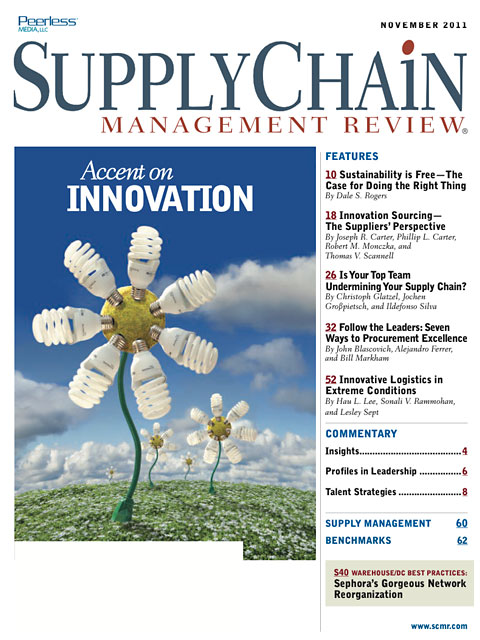Sorry, but your login has failed. Please recheck your login information and resubmit. If your subscription has expired, renew here.
November 2011
Innovation. It’s a hard competency to come by. Can schools teach you to be innovative? Is work experience really the only way to open your eyes to what’s possible? Or is the innovative spark something that lurks in an individual’s DNA—and you either have it or you don’t? Innovation. It’s a hard competency to come by. Can schools teach you to be innovative? Is work experience really the only way to open your eyes to what’s possible? Or is the innovative spark something that lurks in an individual’s DNA—and you either have it or you don’t? Innovation has worked in the Gambia situation and in supplier sourcing. Surely, there must be… Browse this issue archive.Need Help? Contact customer service 847-559-7581 More options
Manyo Gibba, a health worker in Gambia in West Africa, recalls how she used to care for the 20,000 people in the 14 villages assigned to her. To get to the furthest village 20 kilometers away would take a full day on foot. “Many of the communities would not see me for a month or more,” she says.
A social enterprise called Riders for Health has transformed her work day. The organization provided her with a reliable motorcycle, taught her safe riding techniques, and showed her how to perform routine preventative maintenance. Now, she says, “My patients see me at least once a week.”
Riders for Health is a mid-sized non-profit organization based in the United Kingdom and operating in seven African nations. The organization focuses on fleet management of motorcycles and vehicles used to deliver health products and services in rural areas. The cornerstone of Riders’ approach is its “zero breakdown” technique. The approach has three elements: multifaceted rider/driver training; regularly scheduled vehicle maintenance; and local servicing of the vehicles. The overall objective is to operate fleets at the lowest possible cost for the longest possible time, even in difficult conditions.
 |
This complete article is available to subscribers
only. Click on Log In Now at the top of this article for full access. Or, Start your PLUS+ subscription for instant access. |
Not ready to subscribe, but need this article?
Buy the complete article now. Only $20.00. Instant PDF Download.
Access the complete issue of Supply Chain Management Review magazine featuring
this article including every word, chart and table exactly as it appeared in the magazine.
SC
MR
Sorry, but your login has failed. Please recheck your login information and resubmit. If your subscription has expired, renew here.
November 2011
Innovation. It’s a hard competency to come by. Can schools teach you to be innovative? Is work experience really the only way to open your eyes to what’s possible? Or is the innovative spark something that lurks… Browse this issue archive. Download a PDF file of the November 2011 issue.
 |
Download Article PDF |
Manyo Gibba, a health worker in Gambia in West Africa, recalls how she used to care for the 20,000 people in the 14 villages assigned to her. To get to the furthest village 20 kilometers away would take a full day on foot. “Many of the communities would not see me for a month or more,” she says.
A social enterprise called Riders for Health has transformed her work day. The organization provided her with a reliable motorcycle, taught her safe riding techniques, and showed her how to perform routine preventative maintenance. Now, she says, “My patients see me at least once a week.”
Riders for Health is a mid-sized non-profit organization based in the United Kingdom and operating in seven African nations. The organization focuses on fleet management of motorcycles and vehicles used to deliver health products and services in rural areas. The cornerstone of Riders’ approach is its “zero breakdown” technique. The approach has three elements: multifaceted rider/driver training; regularly scheduled vehicle maintenance; and local servicing of the vehicles. The overall objective is to operate fleets at the lowest possible cost for the longest possible time, even in difficult conditions.
 |
SUBSCRIBERS: Click here to download PDF of the full article. |
SC
MR

Latest Supply Chain News
- How CPG brands can deliver on supplier diversity promises
- How S&OP provides the answer to in-demand products
- AI, virtual reality is bringing experiential learning into the modern age
- Humanoid robots’ place in an intralogistics smart robot strategy
- Tips for CIOs to overcome technology talent acquisition troubles
- More News
Latest Podcast

 Explore
Explore
Latest Supply Chain News
- How CPG brands can deliver on supplier diversity promises
- How S&OP provides the answer to in-demand products
- AI, virtual reality is bringing experiential learning into the modern age
- Humanoid robots’ place in an intralogistics smart robot strategy
- Tips for CIOs to overcome technology talent acquisition troubles
- There is still work to do to achieve supply chain stability
- More latest news
Latest Resources

Subscribe

Supply Chain Management Review delivers the best industry content.

Editors’ Picks





